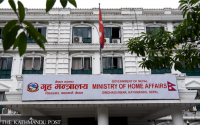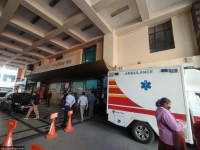National
Agriculture Science course initiated at a community school in Gulmi
Malika Rural Municipality started running the three-year course last year to encourage people to be involved in agricultural entrepreneurships rather than going abroad for employment.
Birendra KC
In a bid to check the increasing trend of leaving arable land fallow, a community school in Malika Rural Municipality has introduced a Diploma in Agriculture course.
The local unit started running the three-year Agriculture Science class at Malika Secondary School last year to encourage people to be involved in various agricultural entrepreneurships rather than going abroad for employment. Currently, 45 students are studying the course for free.
“We introduced the diploma course in agriculture knowing that teaching technical knowledge on how to prepare land and fertilisers, protect plants and animals from diseases and enhance productivity will be helpful in initiating agricultural farming,” said Rit Bahadur Thapa, the chairman of the rural municipality. According to him, the local unit is planning to start such technical courses in other educational institutions in the near future as well.
Malika Secondary School, which is situated at Ward No 8 of Malika Rural Municipality, had collected Rs 4.8 million funds last year by organising educational and religious fairs. The community school started the diploma course in agriculture after the local unit assured them of providing additional budget required for the classes.
Authorities hope that one can easily initiate livestock rearing or agriculture farming after she/he has graduated with a diploma in agriculture.
“The land in our rural municipality is fertile. We can start vegetable farming, livestock farming and other agricultural farming here. Our main aim is to make the village self-dependent and create self-employment activities through agricultural entrepreneurship,” said Thapa. “The students and their guardians are enthusiastic about the course. We will make further plans to link the graduated students with agricultural production projects in the village.”
Besides theoretical knowledge, the institution also provides practical knowledge to its students. The school purchased 20 ropanis of land at Simaltari to run practical classes for the students studying Agriculture Science.
“Both my parents are farmers. I can share with them what I learn theoretically as well as practically here in school. I am now helping my family initiate mushroom and other vegetable farming,” said Ankita, a student pursuing Agriculture Science at the institution. “I plan to initiate commercial vegetable farming after completing my education.”
The students are also optimistic about their future prospects. They are now confident that they can easily earn a living through agriculture entrepreneurship.
“I will initiate my own agriculture farm in the future. We are learning scientific farming methods and how to control insects and diseases to enhance agricultural production,” said Mamata Lamsal, another student at the institution. “The village will be food sovereign in the near future.”
The school management claims that the local farmers have directly or indirectly benefited from the Agriculture Science course.
“Our students have started helping their guardians in farming. The agricultural production is also increasing now,” said Hemraj Paudel, the school principal. He also expressed his hope that the youths in his village would be engaged in commercial farming and not go abroad for employment.




 20.81°C Kathmandu
20.81°C Kathmandu














